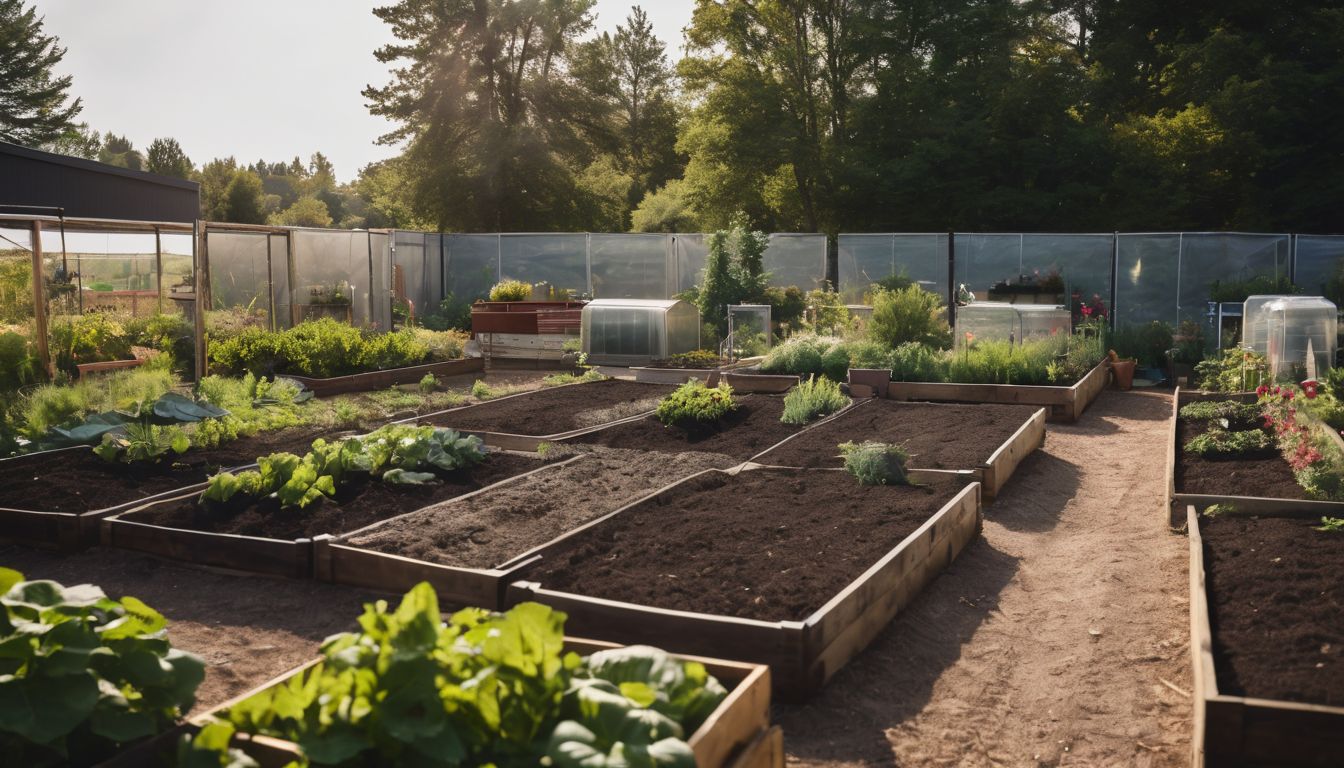As we navigate the pressing task of nourishing an ever-expanding global family without placing further strain on our precious Earth, it’s clear you share a passion for pioneering a future that is both verdant and viable.
We are wholeheartedly alongside you in this journey, having explored agricultural practices that strike a delicate balance between high yields and environmental stewardship. Our workshop dedicated to sustainable agriculture brims with actionable knowledge and interactive activities, all curated to enhance your farming pursuits.
Immerse yourself in the world of conscientious cultivation with us—it’s time for us to nurture growth sustainably, side by side!
Key Takeaways
- Our workshop offers in – depth learning on sustainable agriculture, promoting techniques like crop rotation and integrated pest management to preserve the environment while boosting farm productivity.
- By exploring real – life case studies, participants gain practical insights into effective farming methods that enhance soil fertility, conserve water, and support biodiversity.
- Interactive activities such as hands – on training sessions and group discussions provide attendees with valuable skills they can apply to their own agricultural practices for a more sustainable future.
- Presentations and demonstrations within the workshop showcase innovative solutions in organic pest control, soil conservation, and energy-efficiency that contribute to environmental stewardship.
- Networking opportunities at the event connect individuals passionate about sustainability, fostering ongoing support and collaboration within the community.
Understanding Sustainable Agriculture
We will delve into the definition and principles of sustainable agriculture, highlighting its importance in promoting environmental conservation and agricultural productivity. Additionally, we will explore various successful techniques and practices that contribute to the sustainability of agriculture.
Definition and principles
Sustainable agriculture combines farming techniques that support the environment, public health, human communities, and animal welfare. It focuses on meeting current food production needs without compromising future generations’ ability to do the same.
By integrating three main goals—environmental health, economic profitability, and social equity—we work toward a system that’s balanced and self-sustaining.
At its core are key principles aimed at preserving resources while optimising productivity. We promote crop diversity through practices like crop rotation and intercropping; manage water wisely by using efficient irrigation methods; enhance soil fertility naturally with composting rather than chemical fertilisers; support biodiversity by providing habitats for beneficial insects and wildlife; reduce energy consumption by maximising renewable sources; focus on local markets reducing transportation emissions.
Our aim is to create food systems resilient to challenges like climate change while safeguarding rural agricultural livelihoods.
Importance of promoting sustainable agriculture
Promoting sustainable agriculture is crucial for preserving the environment and ensuring food security. Sustainable farming practices help conserve natural resources, reduce pollution, and protect biodiversity.
By promoting agricultural sustainability, we can create resilient rural communities and support small-scale farming initiatives that contribute to sustainable resource management.
Encouraging the adoption of sustainable farming practices is essential in achieving long-term environmental sustainability while enhancing the quality of life for current and future generations.
These initiatives foster organic farming methods, agroecology, permaculture, and other eco-friendly techniques that promote sustainable food production and contribute to overall environmental conservation efforts.
Embracing these approaches through agricultural workshops and education allows us to empower communities with knowledge and skills to build a more environmentally conscious society.
Workshop Objectives and Goals
In this section, we will delve into the objectives and goals of our sustainable agriculture workshop. We will focus on introducing the concept of sustainable agriculture, conducting farm case studies, and sharing successful techniques and practices to promote environmental-friendly farming methods.
Introducing the concept of sustainable agriculture
Sustainable agriculture aims to meet society’s food and textile needs in the present without compromising the ability of future generations to meet their own. This farming practice promotes long-term environmental stability, economic profitability, and community resilience.
It involves using resources like water, soil, and energy efficiently while supporting biodiversity and animal welfare. The objective is to minimise adverse effects on ecological systems while providing a reliable supply of high-quality produce.
By adopting sustainable agriculture techniques such as crop rotation, integrated pest management, and conservation tillage, farmers can reduce their reliance on chemical inputs. Moreover, practices like agroforestry and organic farming contribute to healthier ecosystems while increasing farm productivity.
Conducting farm case studies
In the workshop, we analyse real-life farm examples to understand their sustainability. By studying these case studies, we gain practical knowledge and insights into sustainable agricultural practices. The farm case studies provide tangible examples of successful techniques and innovations being implemented in rural agriculture.
- We examine different farming methods from small – scale farmers to large agricultural enterprises.
- We evaluate the environmental impact, productivity, and economic viability of each farm.
- We scrutinise the use of resources such as water, land, and energy on these farms.
- We compare traditional farming practices with innovative sustainable agriculture initiatives.
- We identify opportunities for improvement and discuss potential solutions for sustainable development.
Sharing successful techniques and practices
After conducting farm case studies, we can now focus on sharing successful techniques and practices. This will equip you with practical skills that can be implemented in small-scale farming. Here are some valuable methods and practices to consider:
- Implementing crop rotation to enhance soil fertility and reduce pest and disease pressure.
- Utilising integrated pest management strategies to minimise chemical inputs and promote natural ecological balances.
- Incorporating cover cropping to control erosion, fix nitrogen, improve soil structure, and suppress weeds.
- Adopting agroforestry systems to diversify income sources and enhance ecosystem services.
- Introducing efficient irrigation techniques such as drip irrigation or rainwater harvesting to conserve water resources.
- Embracing organic farming methods to minimise environmental impact while producing healthy food.
Workshop Structure and Activities
We will engage in team activities and discussions, as well as presentations and demonstrations to share successful sustainable agriculture techniques. Additionally, on-farm training sessions will be conducted to provide hands-on learning experiences.
Team activities and discussions
Presentations and demonstrations
In our workshop, we engage in engaging and informative presentations and demonstrations. These activities will include:
- Presentations on the principles of sustainable agriculture, providing an overview of the key concepts and practices.
- Demonstrations of successful sustainable farming techniques, such as organic pest control methods and soil conservation practices.
- Case study presentations showcasing real – life examples of farmers who have successfully implemented sustainable agricultural methods.
On-farm training sessions
During the workshop, participants will engage in on-farm training sessions to gain practical insights into sustainable agricultural practices.
- Interactive learning through hands – on activities such as soil testing and composting techniques will provide a deeper understanding of sustainable farming methods.
- Engage with experienced farmers to learn about organic pest management strategies and integrated crop-livestock systems, promoting more holistic and eco-friendly approaches.
- Developing skills in agroforestry and water conservation practices will allow participants to witness firsthand the positive impacts of sustainable agriculture on the environment.
- Attendees will also have the opportunity to explore alternative energy sources and their applications in agricultural settings, imparting knowledge on reducing carbon footprints.
- Gain an understanding of regenerative farming through practical sessions, emphasising the importance of soil health and biodiversity for long-term sustainability.
Conclusion and Impact of Sustainable Agriculture Workshops
In conclusion, participants benefit from valuable knowledge and skills about sustainable agriculture. They gain a deeper understanding of the principles and importance of promoting sustainable farming practices.
The workshops inspire and equip individuals to implement successful techniques and practices on their farms. As a result, these workshops have a direct positive impact on supporting conservation and environmental sustainability in agricultural practices.
FAQs
1. What do I learn by attending a workshop on sustainable agriculture?
You will gain knowledge on sustainable agriculture education, discover effective farming techniques and learn how to use sustainable agriculture resources responsibly.
2. Who should attend workshops on sustainable agriculture?
Anyone interested in learning about modern farming methods, including students of agricultural education and professionals involved in agricultural research, should consider attending.
3. How important is conducting a workshop for agricultural research?
Conducting workshops plays a crucial role in spreading the latest findings in agricultural research, helping farmers stay informed about sustainability practices.
4. Can these workshops improve my understanding of sustainable farming?
Yes, participating actively in such workshops can enhance your comprehension of sustainable agriculture and equip you with practical ways to apply this knowledge in real-world scenarios.





